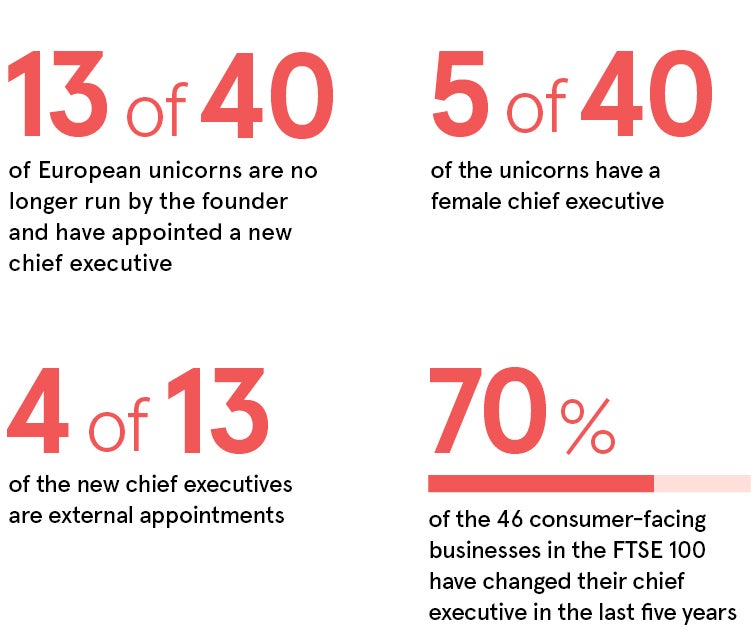Pure-play digital businesses, those “born online”, are no longer small startups and now represent some of the world’s most valuable organisations. In addition, digital is no longer just synonymous with pure-play companies as most established businesses are undergoing digital transformation.
Clare Johnston, chief executive and founder of The Up Group (Up), Europe’s only digitally focused executive search, advisory and networking firm, says the surge in scaled digital pure-play businesses and the acceleration of digital transformation has been driving the creation of a new generation of leader. “A CEO who cannot speak authentically to digital, innovation, technology and customers is becoming less relevant for many businesses,” she says.
According to Up’s research on the 46 consumer-facing businesses in the FTSE 100, some 70 per cent have changed their chief executive in the last five years, with the highest rates of change seen within the most disrupted sectors, such as financial services and retail.
“Traditional businesses now need transformational CEOs,” says Ms Johnston. “On the one hand, the new leaders can drive agility, innovation, creativity and embrace disruption, data and technology. On the other hand, they can operate at scale, often within well-established cultures, governance and organisational structures, and engage with boards who may not be as forward thinking.”
Recently listed pure-play companies are adding a different dimension to the chief executive leadership debate. Spotify, Adyen, Funding Circle and Farfetch are among those still run by founders. These individuals are operating public companies with market capitalisations of several billion dollars and teams of thousands of people, yet in most cases the leaders are first-time entrepreneurs who have never before run large operations. This means they have to adjust to a new era, where success has brought scale, global footprint and increased organisational complexity.

Up’s research also challenges the assumption that founder chief executives are not effective as a company matures and are replaced along the journey by more tenured corporate executives. Of the 40 European present and post unicorns examined, only 13 were no longer run by the founder and had appointed a new chief executive, and of those only four were external appointments. Gender diversity in scaled digital companies is a different, but concerning, topic with only five female chief executives among the 40 unicorns assessed.
Private equity firms are now increasingly investing in digital pure-play companies as well as traditional firms creating value through digitally led transformation. This means that although they historically favoured proven executives, they now need to look for first-time, digitally savvy or native chief executives.
“You only have to look to successful private equity-backed businesses, such as Matches Fashion, Trainline, Photobox, to see the commonalities across their leaders,” explains
Agnes Greaves, managing director of The Up Group. “Such companies have high-calibre, highly analytical, commercially minded, data and tech-savvy executives, with best-in-class experience.”
Never has there been a more transformative time to be in business. As such, it is only natural that the CEO profile of today looks different. Leaders need to combine a set of almost conflicting attributes: visionary and strategic yet execution oriented, data driven and analytical yet creative and innovative, entrepreneurial yet able to rapidly operate at scale on a global stage.
For more information on chief executive board appointments and building leadership teams for companies going through growth and transformation please contact Clare Johnston and Agnes Greaves; visit
www.theupgroup.com and follow us @theupgroup on Twitter

